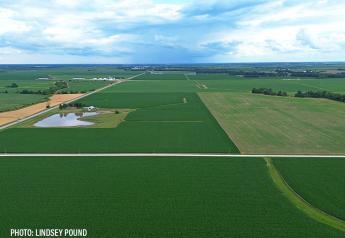Ag Groups Say Strong Chance U.S. Joins the New TPP When Biden Shifts Focus to Trade
USFR-FJR Trade Part 2
As President Biden focuses on COVID-19 recovery and climate initiatives, some agricultural groups think trade will be a key piece of those conversations.
“I think a lot of what they're trying to do requires international cooperation,” says Maria Zieba, director of international affairs for the National Pork Producers Council (NPPC). “In order for things to be successful, whether it's on climate or other issues, you really do need that international cooperation. And that's where with trade, we have a very good track record of working with partners, at least in the trade of goods and services.”
Mending relationships with allies is a move one Ohio grower wants to see.
“I'm looking for the Biden Administration to have a comprehensive policy when it comes to trade,” says Christopher Gibbs, who raises corn, soybeans and hay in west-central Ohio.
In addition to farming, Gibbs is the board president of Rural Voices USA, an organization formerly known as Rural America 2020. The group works to educate Americans on how policies affect rural America.
“The first thing that we need to do, in my view, is to reestablish those relationships that we lost during the Trump Administration with Trump's punitive tariffs,” says Gibbs. “He used Section 232 of the Trade Expansion Act to essentially punish our traditional trading partners, whether it was the EU, whether it was the UK, whether it was Australia or Japan. You name it, everything was on the table at that point.”
President Biden has tapped Katherine Tai as the next U.S. Trade Representative. While the Senate committee has yet to schedule her confirmation hearing, Tai is a nominee that more than 100 food and ag groups signed a letter pushing the Senate to confirm.
“She obviously has a wealth of experience,” says John Linder, an Ohio grower and farmer president of the National Corn Growers Association (NCGA). “And I think she's going to do a fantastic job, and she has support all over town here in Washington. There have been talks about enforcement of existing agreements, and I think that's going to be crucial, especially when we're looking like USMCA (United States-Mexico-Canada Agreement).”
Tai was a key player in the USMCA negotiations, and some organizations and individuals think the agreement may be a template for future trade talks, including the possibility of rejoining what was the Trans-Pacific Partnership (TPP).
“I think there's a chance for the U.S. to rejoin,” says Zieba. “There's been preliminary conversations. There are countries that do want the U.S. involved. And there are other countries that have also expressed interest in joining the new TPP, whether they're the Philippines or even South Korea, and so I think that there's certainly room for expansion of the agreement.”
Farmers for Free Trade says it’s important to remember why the TPP was even created, and the main mission was to address China.
“Well, the original focus of the TPP was a push back on China, and it was to really establish the baseline for negotiations in the future, to go above what the WTO (World Trade Organization) had outlined, and to focus on science-based standards, which is so important for our industry,” says Brian Kuehl of Famers for Free Trade.
“From enforcing USMCA and the Phase One agreement, to crafting trade pacts with other countries, ag groups are hopeful trade continues to be a focus for the White House,” Kuehl adds.
“I think there's a chance for the us to rejoin,” says Zieba. “There's been preliminary conversations. There are countries that do want the U.S. involved. And there are other countries that have also expressed interest in joining the new TPP, whether they're the Philippines or even South Korea, and so I think that there's certainly room for expansion of the agreement.”
Farmers for Free Trade says it’s important to remember why the TPP was even created, and the main mission was to address China.
“Well, the original focus of the TPP was that it was a push back on China, and it was to really establish the baseline for negotiations in the future, to go above what the WTO had outlined, and to focus on science-based standards, which is so important for our industry,” says Brian Kuehl of Famers for Free Trade.
“From enforcing USMCA and the Phase One agreement, to crafting trade pacts with other countries, ag groups are hopeful trade continues to be a focus for the White House.
Related Stories:
Biden's Trade Team is Stacked with USMCA Linchpins
Looking Past China, What Are the Next Big Ag Trade Moves for Biden Administration?
Here's Why a Tough Stance on China Could Continue Under Biden Administration







